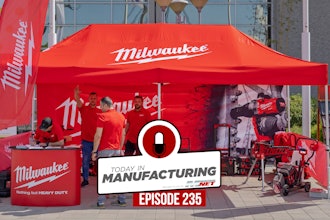Based in Austin, Texas, Apptronik is designing general purpose robots that could change the way we live and work. Founded in 2016, the company was spun out of the Human Centered Robotics Lab at the University of Texas at Austin to "leverage innovative technology for the betterment of society." The company has led the design and development of more than ten general purpose robots, including extensive work on NASA's Valkyrie robot, which is designed to work in dirty, hazardous and remote conditions, like uncrewed offshore energy facilities, the Moon and more.
Last week, Apptronik took its first big swing to change the future of work when the company unveiled Apollo, a humanoid robot built to work alongside workers in warehouses and manufacturing plants.
Designed to transform the industrial workforce, likely by being the new industrial workforce, Apollo is a commercial humanoid robot designed for friendly interaction, mass manufacturability, performance and safety. Think big walking cobot.
Standing 5'8" tall and weighing in at 160 pounds, Apollo can lift 55 pounds and has a unique force control architecture that maintains safe operation around people similar to a collaborative robot. Apptronik is targeting a lot of industries cobots are currently servicing, like trailer unloading, case picking, palletization, machine tending and workcell delivery.
The company hopes to balance robot complexity with approachability to make robots easier to use and work alongside. So, it has digital panels on its chest and face to communicate battery life, current tasks and even a wry grin. In one example, an Apollo called Charlie 4 communicates that it is stocking aisle 14.They say it's a friendly, human-like countenance which is more or less true until the smile becomes a wrench, text bubble or three-dot loading symbol.
Apollo is modular to fit the application. So, you can have a true bipedal walking humanoid or mount its torso on wheels or at a stationary location.
Apptronik designed Apollo for manufacturability, so no single-sourced core components were used and the company believes its location near the Texas-Mexico manufacturing corridor will help it produce affordable robots at scale.
The batteries are swappable and have a four-hour charge, which also means they don't have to be tethered. Apollo will first focus on case and tote handling applications in logistics and manufacturing, but could be a fit in construction, oil and gas, electronics production, retail, home delivery and even elder care.
Jeff Cardenas, co-founder and CEO of Apptronik says, “People don’t want to do robotic, physically demanding work in tough conditions and they shouldn’t have to. Humanoid robots are not just an answer to this challenge, they are a necessity.”
It poses a big question: Do humans care if they are working next to an industrial cobot or prefer a humanoid counterpart? We shall see.






















